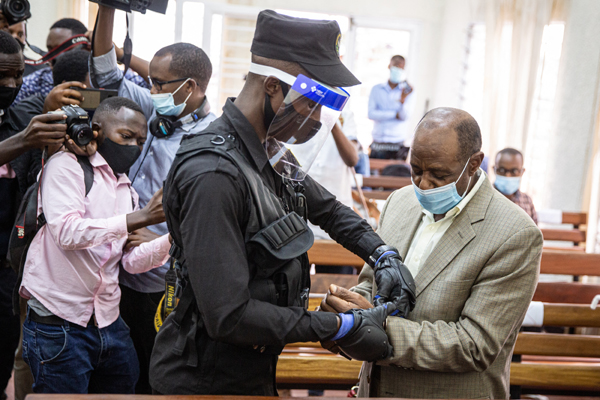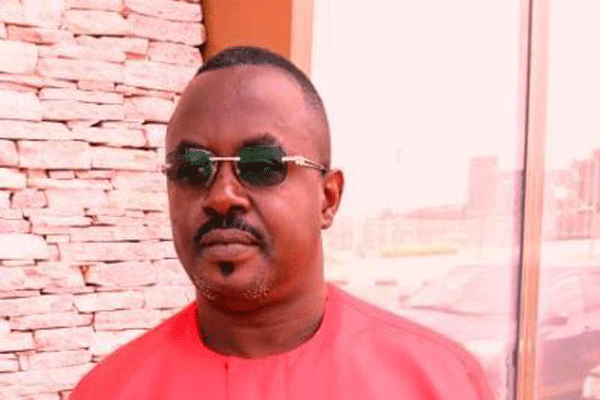Court upholds 25-year sentence for 'Hotel Rwanda' hero

Paul Rusesabagina (R) in the pink inmate's uniform arrives from the Nyarugenge prison with Rwanda Correctional Service (RCS) officers at the Nyarugenge Court of Justice in Kigali, Rwanda, on September 25, 2020. PHOTO/ AFP
What you need to know:
The fiercely outspoken critic of President Paul Kagame, who has been in custody for almost 600 days, was convicted last year after a trial his family and supporters branded a sham that was plagued with irregularities.
Rwanda's Court of Appeal on Monday upheld a 25-year prison term against ailing "Hotel Rwanda" hero Paul Rusesabagina on terrorism charges, rejecting a prosecution appeal to increase the penalty to life.
The fiercely outspoken critic of President Paul Kagame, who has been in custody for almost 600 days, was convicted last year after a trial his family and supporters branded a sham that was plagued with irregularities.
"Since he is a first-time offender, the court finds that his sentence should not be increased, because the 25 years he was given is in accordance with the weight of his crimes, and the court maintains his sentence," said judge Francois Regis Rukundakuvuga.
State prosecutors had appealed the original sentence, saying the punishment against the former Kigali hotel manager was too lenient and should be increased to life.
The court was also ruling Monday on appeals against sentences meted out to Rusesabagina's 20 co-defendants, who were originally jailed for between three and 20 years.
All the accused were convicted in September 2021 of backing an armed rebel group blamed for a spate of deadly attacks in Rwanda in 2018 and 2019.
The 67-year-old Rusesabagina has boycotted almost all proceedings in the case against him, and he was not in court for Monday's ruling.
Rusesabagina is credited with saving more than 1,200 lives during the 1994 genocide, in which 800,000 mostly Tutsis, but also moderate Hutus, were slaughtered.
But, in the years after Hollywood made him an international celebrity, a more complex image emerged of a staunch government critic whose tirades against Kagame led him to be treated as an enemy of the state.
Rusesabagina 'abducted'
Last month, the UN Working Group on Arbitrary Detention concluded that Rusesabagina had been "abducted" when he was arrested in August 2020 and that his detention was "arbitrary", calling for his immediate unconditional release.
Rusesabagina's family -- who have already warned he could die behind bars -- in early March said his health was at a "crisis" point and that he needed treatment immediately.
"(He) appears to have suffered partial facial paralysis which is impairing his speech, following his complaints of ongoing weakness and severe pain in his arm and jaw," the family said in a statement.
"There is no doubt that the mental and physical harm inflicted on Rusesabagina, which includes four days of physical torture and starvation in August 2020, and 250 days of solitary confinement in Rwanda’s Mageragere Prison, will now have a permanent impact on his state of health and remaining quality of life."
Rusesabagina, who is also a Belgian national, became the most famous Rwandan globally after American actor Don Cheadle dramatised his deeds during the genocide in the 2004 Hollywood film "Hotel Rwanda".
He later used his celebrity to denounce rebel-leader-turned-president Kagame, who has been in power since 1994 and is accused by critics of crushing opponents and ruling through fear.
Rusesabagina left Rwanda in 1996, living in Belgium and then the United States, where he has permanent residency.
He was arrested in August 2020 when a plane he believed was bound for Burundi landed instead in Kigali after what his family has described as a kidnapping.
Both the United States and Belgium have voiced concern that Rusesabagina had been denied a fair trial, and his family insist their ailing father has been mistreated in prison and denied proper legal services.
Ahead of the original verdict, Kagame dismissed criticism of the case, saying Rusesabagina was in the dock not because of his fame but over the lives lost "because of his actions".





